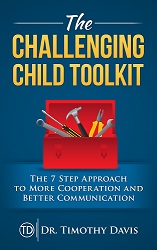It is the nature of power struggles (or of just about any other challenging interaction that we get into with our children) that we find ourselves time and time again caught up in them by surprise. In spite of our best intentions to keep calm, not yell, and avoid the fight, we invariably fall into its trap. This isn’t because we’re lazy, stupid, or a bad parent. It is because of the nature of power struggles. They occur in our emotional blind spots. They occur because of our emotional blind spots.
One of the most powerful tools for reducing power struggles and other negative interactions is to keep a parenting diary. At some time after the power struggle is over, write as detailed a description of it as possible. Start your entry from the point in time that everything seemed fine and then describe moment by moment the course of events from when they were fine to when things had gone wrong. Ask yourself questions as you write: how was I feeling before things started? Tired? Upset about something else? What triggered my child? Was he tired or hungry? What was he upset about? What was going on between us? Was I not paying attention? Was he acting needy or bratty? What memories or feelings does this situation evoke for me? What fears were evoked by the encounter? Do I feel like a bad parent? Am I afraid that others will judge me? Am I afraid that this explosion by my son is the sign of worse things to come? Do I feel panicked that if I don’t do something to stop this behavior right now that he’ll be a delinquent by high school? (I know this may seem extreme, but if you reflect carefully on your thoughts you might be surprised at the extremity of your underlying fears).
Just writing down a description of the power struggle, and the events leading up to it, does a lot. It helps process and relieve the lingering bad feelings from the event (guilt, fear, or anger). Writing about power struggles also leads to beneficial physiological changes in us. Writing leads to a reduction of the hormones that are released by stressful situations like fighting with our kids. These “stress hormones” contribute to exhaustion, over eating, and decreased immune system functioning. So, it’s good to reduce them. (Look at the work of psychologist James Pennebaker for more on the therapeutic effects of writing).
Writing down a description of the power struggle can also help us to develop a greater understanding of the reasons why we acted the way we did in the power struggle. Our diary writing can also help us understand our boy’s behavior better and develop more empathy for him. One diary entry might not shed much light by it self. It might take many diary entries before you develop clarity about what is going on in you and your son in these situations.
Even a single diary entry can do something powerful, however. It allows us to make a plan for how to deal with a similar circumstance when it arises the next time. The reason we find ourselves yelling, or saying or doing other things we regret like giving in to the tantrum is that the emotion centers in our brain have hijacked control of our behavior away from the rational thinking part of our brain. When our emotions have hijacked our brain in this way, we can’t think clearly and we are at risk of doing something to perpetuate the power struggle. We can, however, execute a plan established ahead of time based on our diary work. Because it doesn’t require us to think on our feet, this plan we made in our diary work can be executed even in the heat of the moment.
In addition to using it to work through difficult interactions with our kids, a parenting diary can also be used as a tool to reorient us in a positive direction. Psychologists studying Positive Psychology have found that writing down what we are grateful for helps keep us in a positive mindset. At the end of each entry take a moment for gratitude. Write down 5 things about your son that you are grateful for. It may be his sense of humor, his tenderness in moments when he allows a cuddle, the way he embraces life totally and with intensity. Next write down 5 things about yourself as a parent that you are grateful for. It may be your patience, your dedication (it’s pretty dedicated to read a blog on parenting), your playfulness, your warmth.

